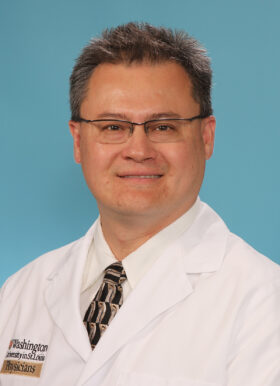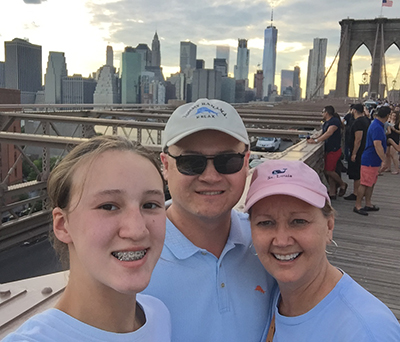John Cole, MD, PhD

John Cole, MD, PhD, is a Washington University Clinical Associates pediatrician.
Dr. Cole sees patients at:
- Kids Docs – St. Louis Children’s Specialty Care Center, 13001 North Outer Forty Road, Suite 340, Town & Country, MO 63017.
Please call 314-454-6444 to make an appointment.
What happened in the course of schooling to influence you to choose your specialty?
I always wanted to be a physician, ever since I was 5 years old — according to my mom. However, as I began my medical school training and my pediatric rotations, I realized how much I enjoyed working with children.
My PhD is in neuroscience and I really enjoyed the research aspect and considered specializing in pediatric neurology. But again, I enjoyed working with children so much and seeing them when they were healthy as well as treating them when they were sick that it was an easy decision to go into general pediatrics.
What brought you to Washington University?
I am actually what you would call a Washington University “lifer.” I completed my undergraduate degree and MD/PhD training here and my residency at St. Louis Children’s Hospital. I had been in private practice for about 10 years when our group made the decision to look for an umbrella organization to join. Washington University was a natural fit. We were glad to come back home.

Which aspect of your practice is most interesting?
I enjoy watching the children grow up from babies to teenagers. I have been in practice for almost 11 years, so my first group of babies is now entering middle school. It has been fun to watch them grow throughout all their early developmental stages and become wonderful young men and women. That by far is the most enjoyable and interesting part of my practice.
Has your background in neuroscience helped you make diagnoses of neurological diseases?
My background in neuroscience has helped me to diagnose some interesting illnesses that perhaps might not have been as easily diagnosed, had I not had that education. However, I received excellent training in all aspects of pediatric medicine from Washington University School of Medicine and the St. Louis Children’s Hospital residency program, and that has served me well.
What new developments in the field of pediatrics are you most excited about?
I am most excited about genetics in terms of identifying and preventing illnesses. The human genome project allows us to gather information about the influence that genetics has on health and disease.
We are on the cusp of interacting with a person’s genome to be able to target treatments for a particular illness, or possibly prevent that illness in the first place. This field will continue to develop over the next several years, with potential for new and targeted therapies emerging in the near future.
What are the recent advances in vaccines?
The advances in vaccines for children now allow us to protect them from more early childhood diseases than ever before. The vaccines are targeted specifically to what stimulates the immune system in order to create immunity for these particular diseases. Even though the children receive a few more shots, they are actually exposed to fewer antigens over the course of their lifetime (~150 antigens instead of >3000 antigens).
An antigen is basically a protein or molecule from an offending infectious agent – whether a bacteria, virus, or fungus – that stimulates the immune system to develop immunity as a defense mechanism against that particular infection. Other types of antigens, such as pollen or proteins from certain foods, are normally benign unless a person’s immune system overreacts to them, causing seasonal allergies or food allergies.
Are you seeing an increase in children with allergies?
Yes, it seems we are seeing more food and seasonal allergies in children these days. Based on research, we’ve found that children who are introduced to foods like peanut and tree nut products earlier in life may actually develop fewer allergies as they grow older.
Pediatricians used to tell parents to wait until their children were older to introduce peanut or nut products, but now we know it can be beneficial to give these foods when a child is as young as four to six months old.
Most of the time parents can do this at home with guidance from their pediatrician. However, if the child has eczema or there is a strong family history of a nut allergy or asthma, then it would be safer to introduce soft peanut or nut products (like peanut butter) in the pediatrician’s or pediatric allergist’s office to make sure there is no severe allergic reaction.
Where are you from?
I am originally from Utica, a small town in northwest Missouri (population 300) — right outside Chillicothe, Missouri (population 9000). I came to St. Louis in 1991 for college at Washington University and have been here ever since.
Which particular award or achievement is most gratifying?
There are two awards in my career thus far that are the most gratifying. The first award was when I was in my MD/PhD training. I started as a teaching assistant for the physiology class for the first year medical students. I really enjoyed working with them and I guess they enjoyed working with me, because they were so kind to give me the Teaching Assistant of the Year award. That made me feel like my commitment to teaching was worthwhile.
Coupled with that, the second award I received was the Community Outpatient Preceptor Experience award (COPE Award). During our residency training, pediatric residents are paired with a pediatrician in the community to learn more about general pediatrics in the outpatient setting. I enjoyed this experience tremendously and it helped me choose a career in general pediatrics. The COPE award is given to the resident who best demonstrates his or her commitment to community pediatrics and teaching – which are my two passions.
What is the best advice you’ve received?
The best medical advice I have received would be from Dr. Robert Paine during my first two years of medical school. When I worked with him in a community clinic, he taught me that about 80% of diagnoses can be made simply by the physician listening to the patient — be quiet enough to listen and hear his or her story, ask appropriately focused questions, and then use the collected information to direct your physical exam and orders to help arrive at the correct diagnosis.
Dr. Paine was a tremendously wise and experienced doctor who took the time to work with young medical students and help us develop our skills – he was a great influence on many physicians now in practice.
Another guiding force in my pediatric career was Dr. Jim Keating, who for many years was the pediatric residency director at St. Louis Children’s Hospital. He was known throughout the hospital for caring about the residents – wanting them to get the best training possible and holding them to a very high standard. I appreciated his thoughtfulness and how he, himself, never stopped learning – even though he was a world-renowned pediatric gastroenterologist and diagnostic genius.
If you weren’t a doctor, what would you like to be doing?
That is a hard question to answer because as I have said, I always wanted to be a physician ever since I was young. But if I wasn’t a physician, it would definitely be something in the sciences – I have always enjoyed science and math, so some career in engineering or biology would be most likely.
Do your patients recognize you outside the office?
One of the big joys of my life is when I am outside the office and patients see me. I say hello, give the kids high fives, and ask how their day is going. It really helps us connect, and I am so happy that the children feel comfortable enough to come up and greet me.
Do you have any advice to help choose a pediatrician?
It is very important for families to find a pediatrician who is going to take the time to listen to them and their concerns, reassure them and make them feel comfortable, and help them to learn about the issues and the questions that face their children. That is hard to do in short office visits where the doctor is in and out of the room before any real conversation can occur.
My office staff, partners and I make sure to spend that extra time with our patients. When our patients leave the office, we want them to understand and feel confident with the information they have received so that they will be empowered to put that advice into practice. I truly believe that you can be the smartest doctor in the world, but that if you don’t communicate effectively with your patients, then you have not accomplished much in helping them.